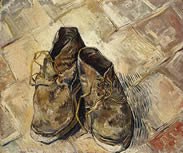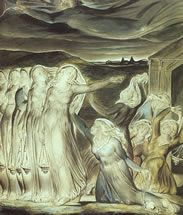Solemnity of the Feast of St. Agnes
Song of Songs 2:10-13
Matthew 25:1-13
+ In the Name of the Father, and of the Son, and of the Holy Ghost. Amen.
DESPITE the great tradition of preaching on the Song of Songs, exemplified by the monk St Bernard, I never hear a sermon on it. We leave eroticism at the church door; we are shamed by Roman Catholic clergy-scandals. As Roman Catholic monk, I cannot change this. But I take as text a line just before the lyrical First Reading, in which the beloved says, "Stay me with flagons, comfort me with apples, for I am sick with love"(Song 2.5). Passing by sacramental images of food and drink, and the itching agony that accompanies intense emotion, let us focus on the words "comfort me."
 I visualize a painting by VanGogh of shoes on a tile floor, worn work-shoes molded to the peculiar contours of
the owner's feet, just vacated with laces aflutter: we almost hear
the sigh as stockinged feet begin to breathe. I think of my father
who never wore his workshoes inside, scrupulously leaving traces of
the barn in the enclosed porch. In my little book of art-meditations,[1] the drawing has a quotation by
VanGogh: "In a picture I want to say something comforting."
I visualize a painting by VanGogh of shoes on a tile floor, worn work-shoes molded to the peculiar contours of
the owner's feet, just vacated with laces aflutter: we almost hear
the sigh as stockinged feet begin to breathe. I think of my father
who never wore his workshoes inside, scrupulously leaving traces of
the barn in the enclosed porch. In my little book of art-meditations,[1] the drawing has a quotation by
VanGogh: "In a picture I want to say something comforting."
This is not the VanGogh of steroid-pumped sunflowers or amputated ear, not suicidal romantic but a classicist like Dr Samuel Johnson saying that the purpose of art is to help us "enjoy or endure." We hope to enjoy life, but sometimes the best we can do is endure. If religion is an art, the preacher should also "say something comforting."
The danger is sentimentality; the remedy, a passage from novelist Barbara Pym, whose personal life was deeply rooted in her Christian faith. I remember her with special tenderness in this house dedicated to the liturgical practice which formed her. Here is a piece of juvenilia [2], lacking the subtlety of her mature work, yet with its own truth. At an Oxford tea-party a thin, used-up-looking woman speaks to a domineering old lady.
Used-up says, "I think it's nice for students to have all these clubs (Labor Club, Drama Society). They must be a great comfort."
"Comfort?" growls Old Lady. "Why should young men need comfort?"
"They don't need it in the way we do," mumbles Used-Up, "but surely everyone alive needs it in some way. Not if you're dead, I suppose. I should need no comfort if I were at rest in my marble vault."[3]
"I hardly think," says Old Lady, "that burial in marble is likely for you."
 This is a marvelous lead-in to
the uncomfortable parable of the Wise and Foolish Virgins. I can scarcely
believe the story came from the mouth which said "blessed are
the poor in spirit"--as one version puts it, "how blest
are those who know their need of God!" Do not the foolish virgins
know their need of oil? How can we admire those arrogant wise virgins,
refusing to share, vainglorious of their efficiency, whisking inside
while their neighbors are at the corner-store? How do they fit with
"the foolishness of God," his absurd preference for the
unlikely?
This is a marvelous lead-in to
the uncomfortable parable of the Wise and Foolish Virgins. I can scarcely
believe the story came from the mouth which said "blessed are
the poor in spirit"--as one version puts it, "how blest
are those who know their need of God!" Do not the foolish virgins
know their need of oil? How can we admire those arrogant wise virgins,
refusing to share, vainglorious of their efficiency, whisking inside
while their neighbors are at the corner-store? How do they fit with
"the foolishness of God," his absurd preference for the
unlikely?
God forgive my crude interpretation, for the parable did inspire the great cantata "Wachet auf," in which Bach presents the elaborate courtly dance between the Soul and the Savior. The soprano's anguish and the baritone's encouragement show us the paradox at the heart of Christianity: how the gruesome death of St Agnes is really victory and comfort.
Such truth must be apprehended not as idea or art, but experience. Faith must include manure on the boots, not a sanitized rendering. So, using the guest's privilege of free speech without having to face you next Sunday, I accept your rector's invitation to speak autobiographically, which has always been a vehicle for Christian witness. By presenting myself as a monk (and a Roman one!), it's cheating to avoid questions like "Why did you become a monk? How could you give up marriage? And being born of good Protestant stock, why Roman?"
The bottom-line lies in a dissatisfied temperament. One personality profile[4] describes my type always looking for "something special" outside of the present reality. This is not admirable but it need not be a curse. It's a bit like the Foolish Virgin: lacking oil, or the right kind of oil, being always in the wrong place at the wrong time.
My conversion story is a corruption of the classic form. The classic conversion story-Mary Magdalene, Paul, Augustine, Simone Weil--shows how you live in darkness: the pre-conversion phase is often the most interesting part. Then comes the overpowering experience on the Damascus Road, changing you completely in order to live happily ever after. The action-pattern is linear: rising to dramatic climax, quickly followed by curtain and applause. My story is less straightforward.
I am the product of a late, happy marriage of unsophisticated working-class parents. My mother married at 39, had me at 40. I was quiet, neurotic, intellectual as befits the firstborn; my younger brother was mischievous, hyperactive, and in adulthood unusually calm. My parents practiced faith quietly, not fanatically, but with absolute consistency. There were devotions twice a day out-loud, a pattern practiced in my mother's 90th year. I admire and feel unworthy of this.
Not fitting the cultural landscape as well as my brother, in the course of time I became a Lutheran minister. Ordained at 26, I was too young to handle a small rural congregation, but luckily I didn't ruin it. The people gave affection and respect, but I was dissatisfied and unable to manage my free time. I needed more structure, I felt I needed more authority than the Protestant mainline offered. I felt like an outsider, inclined to more ritual than Lutherans want.
So, believing I acted by principle, but taking the escape-hatch from deeper "issues" I didn't want to face, I took instruction in Catholicism, resigned my parish, "went over." I was 30 and wanted to live happily ever after. That's how conversion-stories work. There was a dramatic moment of illumination; I suffered my parents' mild grief and disapproval. As I turn 50, I hope I have some self-awareness but make no great claim to maturity or self-actualizing adulthood. People who choose to live in an institution (as I do) are emotionally weaker than those living on the outside: cases of "arrested development" with a greater need for security than the average person.
There was a lot of bumpiness in my early years at St Anselm's. I had the gratifying experience of feeling oppressed by the power-structure in regard to my solemn vows, which were delayed for several years. They were uncertain of my opinions on controversial issues. This stress forced me to make room for ambiguity and compromise, though not all that comfortably.
Despite St Benedict's absolute prohibition against complaining or "murmuring" [Rule, Chapter 34, "Whether All Should Receive in Equal Measure What Is Necessary;" and Chapter 40, "Of the Quantity of Drink"], I belong to a community whose members do a lot of it. Observance is too strict, too relaxed; the one point of agreement would be that the people we live and put up with are absolutely impossible. Sadly, I complain too, and insufficiently acknowledge the luxuries the institution has given me. I was given organ lessons to become the community musician (and don't have to share the bench with anyone); I had the leisure to follow literary interests, even pursuing them overseas in Britain under the rubric of priestly formation; I sometimes make interesting friends (Father Davenport); I live in a wonderful city under enclosure so light that I can explore it--how many Benedictines (or people) can say that?
The cornerstones of my spiritual life are indicated by the Religion electives
I offer in our Abbey
School ("education giving Benedictine balance to gifted young
men" the propaganda says). One course is about Protestant hymnwriters
(
How do you get away with this? It sounds like you are in the wrong church! Probably, but I like to think I may be in the right pew. It's why I champion the Foolish Virgins, lacking lamp-oil, but specializing in being at the wrong place at the wrong time. As a child I wasn't an evangelical, as a Lutheran minister I was too catholic, as a monk of St Anselm's I have probably found my true identity as an old-fashioned Pilgrim's Progress evangelical! In sum, the failed conversion-story, psychology might diagnose the "need" to be an outsider. I prefer T.S.Eliot: "We shall not cease from exploration/ And the end of all our exploring/ Will be to arrive where we started/ And know the place for the first time."[6] Are you happy? Is monasticism worth it? Did you find what you sought? The answer is a Mona Lisa smile, and quoting from words of Christ, true for any believer, clergy or lay, wise or foolish: "I will not leave you comfortless: I will come to you: the world will not see me but you will: because I live you shall live too."[7] That is comfort. (1544)
+ In the Name of the Father, and of the Son, and of the Holy Ghost. Amen.
[1] The Quiet Eye, Sylvia Shaw Judson.
[2] Crampton Hodnet.
[3] "Nor in thy marble vault shall sound/ My echoing song." Marvell's "To His Coy Mistress"
[4] Enneagram: type 4
[5] --one of whose gems we will sing after communion: "O what their joy and their glory must be."
[6] "Little Gidding"(part V)
[7] John 14.18-19
Amen.
©2005 Paul Gabriel Myers
